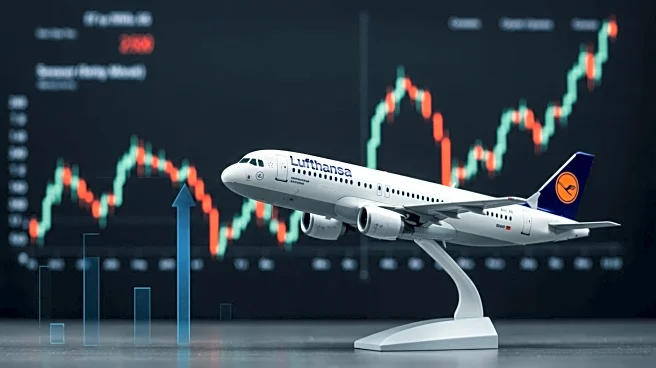What's Happening?
Lufthansa Group has finalized its investment in Air Baltic, contributing €28 million ($32.8 million) alongside the Latvian government, which is co-investing under similar terms. This development comes as Air Baltic prepares for an initial public offering (IPO) aimed at raising €250-300 million, scheduled for the second quarter of 2026. The investment will aid Air Baltic's expansion plans, including increasing its fleet to 100 aircraft by 2029. Currently, Air Baltic operates 50 Airbus A220s and plans to expand to 57 aircraft by mid-2026 through lease agreements. However, the IPO delay has introduced uncertainty regarding future aircraft deliveries, prompting discussions with Airbus to address potential delays.
Why It's Important?
The investment by Lufthansa and the upcoming IPO are crucial for Air Baltic's strategic growth and fleet expansion. This move is significant for the European aviation market, as it strengthens Air Baltic's position and potentially enhances competition. The expansion could lead to increased connectivity and service offerings in the region, benefiting passengers and potentially lowering travel costs. Additionally, the involvement of Lufthansa, a major player in the aviation industry, underscores the importance of strategic partnerships in navigating financial uncertainties and achieving growth objectives.
What's Next?
Air Baltic is focused on securing additional funding through its IPO to support its expansion plans. The appointment of Erno Hilden as the new CEO is expected to be a pivotal step in preparing the airline for public market readiness. The company aims to resolve fleet delivery uncertainties with Airbus, contingent on successful funding rounds. Stakeholders, including investors and industry partners, will be closely monitoring these developments, as they could influence Air Baltic's market position and operational capabilities.
Beyond the Headlines
The investment and IPO preparations highlight the broader trend of consolidation and strategic partnerships in the aviation industry. This approach is increasingly vital for airlines to manage financial risks and pursue growth in a competitive market. The focus on fleet expansion and leadership changes also reflects the industry's emphasis on operational efficiency and market adaptability.











